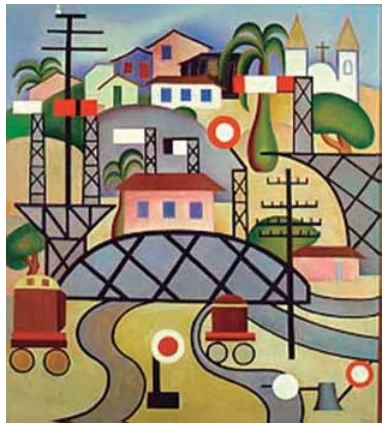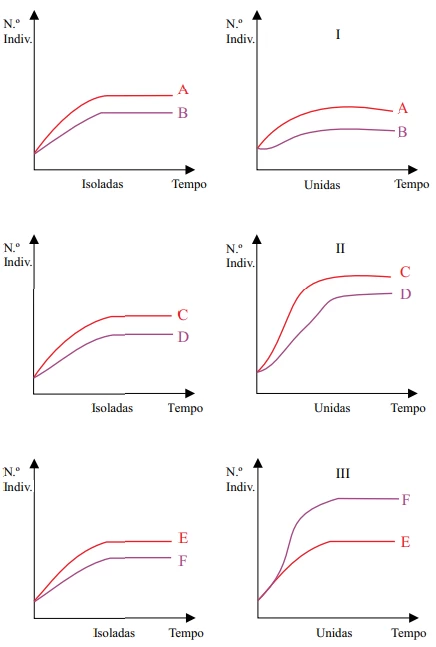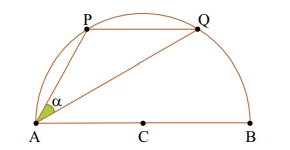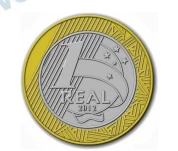2014
Exibindo questões de 201 a 300.
Em 3 de outubro de 1953, o presidente Getúlio Vargas - FGV 2014
História - 2014Em 3 de outubro de 1953, o presidente Getúlio Vargas sancionou a Lei n.º 2.004, que criava a Petrobras.
Observe os dois cartuns. Sobre as imagens, é correto afirma - FGV 2014
História - 2014Observe os dois cartuns.

Observe o quadro Estrada de Ferro Central do Brasil (1924), - FGV 2014
História - 2014Observe o quadro Estrada de Ferro Central do Brasil (1924), de Tarsila do Amaral.

Somente a partir de 1850 vai se observar um maior dinamismo - FGV 2014
História - 2014Somente a partir de 1850 vai se observar um maior dinamismo no desenvolvimento econômico do país em geral e de suas manufaturas, em particular. O crescimento do número de empresas industriais se faria com relativa rapidez.
Mas o que provocaria essas mudanças?
A nova entrada da pobreza indigente será não mais um - FGV 2014
História - 2014A nova entrada da pobreza indigente será não mais um fenômeno temporário do desemprego ou como resistência ao trabalho dos pobres não moralizados, mas como Criatura da própria sociedade industrial, como resíduo que, produzido por ela, nela não tem lugar. É em Londres que o sistema de fábrica despeja sua escória humana. Mais uma vez questiona-se o pensamento liberal em um dos seus pressupostos básicos, o laissez-faire.
Uns pedem ao governo leis severas de controle da superpopulação e medidas no sentido de se exportar o resíduo para as colônias.
Em contraste com a estagnação e mesmo a decadência de - FGV 2014
História - 2014Em contraste com a estagnação e mesmo a decadência de outras regiões do Império, o vale do Paraíba do Sul apresentava-se em franco progresso, especialmente a partir da década de 1830-1840. Em torno dos novos-ricos dessa região, formar-se-ia um novo bloco de poder, cuja hegemonia, durante muitos anos, não seria contestada.
(...) Nós temos essas verdades como evidentes por si mesmas - FGV 2014
História - 2014(...) Nós temos essas verdades como evidentes por si mesmas: que todos os homens nascem iguais; que o seu Criador os dotou de certos direitos inalienáveis, entre os quais a Vida, a Liberdade e a procura da Felicidade; que para garantir esses direitos, os homens instituem entre eles Governos, cujo justo poder emana do consentimento dos governados; que, se um governo, seja qual for a sua forma, chega a não reconhecer esses fins, o povo tem o direito de modificá-lo ou de aboli-lo e de instituir um novo governo, que fundará sobre tais princípios e de que ele organizará os poderes segundo as formas que lhe parecem mais próprias para garantir a sua Segurança e a sua Felicidade.
O trabalho escravo nas minas tinha singularidade, era uma - FGV 2014
História - 2014O trabalho escravo nas minas tinha singularidade, era uma realidade bem distinta das áreas agrícolas. O complexo meio social lhe permitia maior iniciativa e mobilidade.
Feitas as contas, a historiografia tradicional do - FGV 2014
Biologia - 2014Feitas as contas, a historiografia tradicional do bandeirantismo errou na proposição secundária (as bandeiras caçavam índios para vendê-los no Norte), mas acertou na principal (as bandeiras foram originadas pela quebra do tráfico atlântico): os anos 1625-50 configuram, incontestavelmente, um período de “fome de cativos”.
O paradoxo aparente do absolutismo na Europa ocidental era - FGV 2014
História - 2014O paradoxo aparente do absolutismo na Europa ocidental era que ele representava fundamentalmente um aparelho de proteção da propriedade dos privilégios aristocráticos, embora, ao mesmo tempo, os meios pelos quais tal proteção era concedida pudessem assegurar simultaneamente os interesses básicos das classes mercantis e manufatureiras nascentes. Essencialmente, o absolutismo era apenas isto: um aparelho de dominação feudal recolocado e reforçado, destinado a sujeitar as massas camponesas à sua posição tradicional. Nunca foi um árbitro entre a aristocracia e a burguesia, e menos ainda um instrumento da burguesia nascente contra a aristocracia: ele era a nova carapaça política de uma nobreza atemorizada.
Sobre as relações entre os reinos ibéricos e a expansão - FGV 2014
História - 2014Sobre as relações entre os reinos ibéricos e a expansão ultramarina,
[A crise] do feudalismo deriva não propriamente do - FGV 2014
História - 2014[A crise] do feudalismo deriva não propriamente do renascimento do comércio em si mesmo, mas da maneira pela qual a estrutura feudal reage ao impacto da economia de mercado. O revivescimento do comércio (isto é, a instauração de um setor mercantil na economia e o desenvolvimento de um setor urbano na sociedade) pode promover, de um lado, a lenta dissolução dos laços servis, e de outro lado, o enrijecimento da servidão. (...) Nos dois setores, abre-se pois a crise social.
O anfiteatro era, para os romanos, parte de sua normalidade - FGV 2014
História - 2014O anfiteatro era, para os romanos, parte de sua normalidade cotidiana, um lugar no qual reafirmavam seus valores e sua concepção do “normal”. Nos anfiteatros eram expostos, para serem supliciados, bárbaros vencidos, inimigos que se haviam insurgido contra a ordem romana. Nos anfiteatros se supliciavam, também, bandidos e marginais, como por vezes os cristãos, que eram jogados às feras e dados como espetáculo, para o prazer de seus algozes ou daqueles que defendiam os valores normais da sociedade.
Um grupo de estudantes percorria uma trilha pela Mata - FGV 2014
Biologia - 2014Um grupo de estudantes percorria uma trilha pela Mata Atlântica, quando um deles observou, na ponta de um bambuzeiro, estruturas vegetais que, a princípio, desconheciam. Iniciaram então, sem grande aprofundamento, um curto “debate botânico científico” sobre a classificação de tais estruturas, devidamente registradas na imagem.

A difilobotríase é uma parasitose adquirida pela ingestão - FGV 2014
Biologia - 2014A difilobotríase é uma parasitose adquirida pela ingestão de carne de peixe crua, mal cozida, congelada ou defumada em temperaturas inadequadas, contaminada pela forma larval do agente etiológico.
O ciclo do parasita envolve a liberação de proglotes pelas fezes humanas repletas de ovos, que eclodem na água e passam a se hospedar sequencialmente em pequenos crustáceos, em pequenos peixes e, finalmente, em peixes maiores que, ao serem ingeridos nas condições citadas, contaminam os seres humanos.
Leia a notícia a seguir. “Uma equipe de investigadores da - FGV 2014
Biologia - 2014Leia a notícia a seguir.
“Uma equipe de investigadores da Escócia estudou três galináceos ginandromorfos, ou seja, com características de ambos os sexos. A figura mostra um dos galináceos estudados, batizado de Sam, cujo lado esquerdo do corpo apresenta a penugem esbranquiçada e os músculos bem desenvolvidos, como observado em galos. Já no lado direito do corpo, as penas são castanhas e os músculos mais delgados, como é normal nas galinhas. No caso dos galináceos, a determinação sexual ocorre pelo sistema ZW.”

A produção de adenosina trifosfato (ATP) nas células - FGV 2014
Biologia - 2014A produção de adenosina trifosfato (ATP) nas células eucarióticas animais acontece, essencialmente, nas cristas mitocondriais, em função de uma cadeia de proteínas transportadoras de elétrons, a cadeia respiratória.
Mosquitos psicodídeos são bastante comuns nos banheiros das - FGV 2014
Biologia - 2014Mosquitos psicodídeos são bastante comuns nos banheiros das residências, sendo geralmente inofensivos ao ser humano, exceto quando ocorre o transporte de patógenos em suas pernas, ao pousarem em diferentes locais.
As figuras ilustram o adulto e a larva do inseto conhecido popularmente como “mosca de banheiro”.

Na difícil busca pela explicação científica sobre a origem - FGV 2014
Biologia - 2014Na difícil busca pela explicação científica sobre a origem da vida no planeta Terra, uma das etapas consideradas essenciais é o surgimento de aglomerados de proteínas, os coacervatos, capazes de isolar um meio interno do ambiente externo, permitindo que reações bioquímicas ocorressem dentro dessas estruturas de forma diferenciada do meio externo.
Um dos procedimentos médicos em casos de obstrução de - FUGV 2014
Biologia - 2014Um dos procedimentos médicos em casos de obstrução de vasos sanguíneos cardíacos, causada geralmente por acúmulo de placas de gordura nas paredes (Figura 1), é a colocação de um tubo metálico expansível em forma de malha, denominado stent (Figura 2), evitando o infarto do miocárdio.

A orquídea Ophrys apifera, ilustrada em visão lateral e - FGV 2014
Biologia - 2014A orquídea Ophrys apifera, ilustrada em visão lateral e frontal nas figuras, apresenta um formato que mimetiza as vespas fêmeas. São capazes de produzir também uma substância odorífera similar ao feromônio liberado por essas vespas fêmeas em épocas reprodutivas, atraindo, portanto, vespas machos que realizarão a polinização cruzada.

Uma determinada característica genética de um grupo de - FGV 2014
Biologia - 2014Uma determinada característica genética de um grupo de animais invertebrados é condicionada por apenas um par de alelos autossômicos. Estudos de genética de populações, nestes animais, mostraram que a frequência do alelo recessivo é três vezes maior que a frequência do alelo dominante, para a característica analisada em questão.
O cultivo de hortaliças hidropônicas é uma alternativa para - FGV 2014
Biologia - 2014O cultivo de hortaliças hidropônicas é uma alternativa para a produção de alimentos em locais cujos solos estão contaminados. Nesta técnica agrícola, os vegetais são geralmente cultivados apoiados em instalações de tubos plásticos, não entrando em contato direto com o solo, conforme ilustra a figura.

“Por volta de 1850, em Manchester, Inglaterra, predominava - FGV 2014
Biologia - 2014“Por volta de 1850, em Manchester, Inglaterra, predominava uma população de mariposas brancas com algumas manchas negras. Após a Revolução Industrial, mariposas escuras passaram a ser encontradas em número cada vez maior, tornando-se mais frequentes, representando cerca de 98% de toda a população (I).
Estudos realizados pelo cientista inglês H. B. Kettlewell mostraram que, em regiões não poluídas, os pássaros atacavam principalmente as mariposas escuras, pois as brancas ficavam camufladas sobre os troncos cobertos de liquens brancos.
Com a industrialização, a fuligem expelida pelas chaminés determinou a morte dos liquens, deixando os troncos escuros e expostos (II)”.
Para realizar o teste do etilômetro, popularmente chamado - FGV 2014
Biologia - 2014Para realizar o teste do etilômetro, popularmente chamado de bafômetro, uma pessoa precisa expirar um determinado volume de ar para dentro do equipamento, através de um bocal.
Analise os gráficos a seguir, os quais ilustram três - FGV 2014
Biologia - 2014Analise os gráficos a seguir, os quais ilustram três interações ecológicas entre espécies diferentes.

A figura ilustra o momento do início da fusão de dois - FGV 2014
Biologia - 2014A figura ilustra o momento do início da fusão de dois núcleos de células reprodutivas humanas sem anomalias.

Os cladogramas a seguir ilustram os conceitos de grupos - FGV 2014
Biologia - 2014Os cladogramas a seguir ilustram os conceitos de grupos parafiléticos e monofiléticos
- FGV 2014
Matemática - 2014Sejam M3x3 e N4x4 as matrizes quadradas indicadas a seguir, com a, b, c, d, e, f, g, h, i, j sendo números reais.

Investindo certo capital a juros compostos de k% ao mês, o - FGV 2014
Matemática - 2014Investindo certo capital a juros compostos de k% ao mês, o capital investido será acrescido em 60% no período de 5 meses. Consultando dados do gráfico a seguir,
Em uma urna, temos 32 objetos, que são: 8 dados brancos, 8 - FGV 2014
Matemática - 2014Em uma urna, temos 32 objetos, que são: 8 dados brancos, 8 dados pretos, 8 esferas brancas e 8 esferas pretas.
No gráfico, observam-se uma senoide de equação y = –4 sen x - FGV 2014
Matemática - 2014No gráfico, observam-se uma senoide de equação y = –4 sen x e uma reta de coeficiente angular igual a –1, que intersecta a senoide e o eixo x no mesmo ponto do plano cartesiano.

Os pontos P e Q estão em uma semicircunferência de centro C - FGV 2014
Matemática - 2014Os pontos P e Q estão em uma semicircunferência de centro C e diâmetro AB, formando com A o triângulo APQ, conforme indica a figura.
Renato participou de uma sequência de seis apostas - FGV 2014
Matemática - 2014Renato participou de uma sequência de seis apostas consecutivas. Em cada aposta, ele arriscou ganhar ou perder metade do valor apostado. Renato começou apostando R$ 100,00 e, durante as demais apostas, sempre apostou todo o saldo do dinheiro que tinha ao final da aposta anterior. Sabe-se que Renato ganhou três e perdeu três das seis apostas.
O losango ABCD, indicado na figura, tem lado de medida 6 cm - FGV 2014
Matemática - 2014O losango ABCD, indicado na figura, tem lado de medida 6 cm. Esse losango será rotacionado em 360° em torno de uma reta r que contém seu lado AB.

Um semáforo de trânsito está regulado de forma que a luz - FGV 2014
Matemática - 2014Um semáforo de trânsito está regulado de forma que a luz verde fica acesa por 30 segundos, em seguida se acende a luz amarela por 3 segundos, e depois a luz vermelha por 30 segundos.
No desenvolvimento do binômio 7 1 2 Ax 2 x- FGV 2014
Matemática - 2014No desenvolvimento do binômio  segundo a ordem decrescente de seus expoentes, o quinto termo é igual a
segundo a ordem decrescente de seus expoentes, o quinto termo é igual a  com A e B constantes racionais.
com A e B constantes racionais.
O triângulo PQT, indicado na figura, está inscrito em uma - FGV 2014
Matemática - 2014O triângulo PQT, indicado na figura, está inscrito em uma circunferência de centro C, sendo que as medidas dos ângulos PCˆQ e TCˆQ são, respectivamente, iguais a α e

Com relação ao polinômio de coeficientes reais dado por - FGV 2014
Matemática - 2014Com relação ao polinômio de coeficientes reais dado por P(x) = x4 + ax3 + bx2 + cx + d, sabe-se que P(2i) = P(2 + i) = 0, com i2 = –1.
O conjunto solução da equação (x2 – 14)2 · (3y – 9)3 = 108, - FGV 2014
Matemática - 2014O conjunto solução da equação (x2 – 14)2 · (3y – 9)3 = 108, com x e y inteiros, possui n pares ordenados (x, y).
Existem três possibilidades de rota (A, B e C) para a - FGV 2014
Matemática - 2014Existem três possibilidades de rota (A, B e C) para a construção de uma nova linha do metrô. De acordo com estudos iniciais de viabilidade, a probabilidade de que a rota B seja escolhida é 10% maior do que a probabilidade de que a rota C seja escolhida. Os mesmos estudos revelam que a probabilidade de que a rota C seja escolhida é 20% maior do que a probabilidade de que rota A seja escolhida.
Se a soma dos inversos das raízes reais da equação - FUVEST 2023
Matemática - 2014Se a soma dos inversos das raízes reais da equação polinomial x2 – 2kx + 36 = 0, em que k é uma constante
Admita que (A, B, C, D, E, F) seja uma sêxtupla ordenada de - FGV 2014
Matemática - 2014Admita que (A, B, C, D, E, F) seja uma sêxtupla ordenada de números inteiros maiores ou iguais a 1 tais que A ≤ B ≤ C ≤ D ≤ E ≤ F.
A respeito dos números que compõem essa sêxtupla, sabe-se que:
a mediana e a moda da sequência A, B, C, D, E, F são, ambas, iguais a 2;
a diferença entre F e A é 19.
Seja k um número real tal que os gráficos das funções reais - FGV 2014
Matemática - 2014Seja k um número real tal que os gráficos das funções reais dadas por y = |x| e y = –|x|+ k delimitem um polígono de área 16.
13 A A atual moeda de 1 real é composta de aço inox no - FGV 2014
Matemática - 2014A atual moeda de 1 real é composta de aço inox no círculo central e de aço inox revestido de bronze na coroa circular. Essa moeda possui diâmetro e espessura aproximados de 26 e 2 milímetros, respectivamente. Uma corda no círculo dessa moeda que seja tangente ao círculo central de aço inox mede, aproximadamente, 18 milímetros.
No interior e no exterior do triângulo ABC, com dados - FGV 2014
Matemática - 2014No interior e no exterior do triângulo ABC, com dados indicados na figura, serão marcados os pontos distintos P’ e P”. Ligando-se convenientemente cada um desses pontos com os vértices do triângulo ABC, os polígonos obtidos serão pipas côncavas de área 16.

Os números naturais ímpares foram dispostos em um arranjo - FGV 2014
Matemática - 2014Os números naturais ímpares foram dispostos em um arranjo triangular, como indica a figura.

A figura indica um retângulo ABCD, com AB = 10 cm e AD = 6 - FGV 2014
Matemática - 2014A figura indica um retângulo ABCD, com AB = 10 cm e AD = 6 cm. Os pontos M, N e P estão nos lados do retângulo, sendo que M é ponto médio de BC, e AN = 8 cm.

Se o sétimo termo de uma progressão geométrica de termos - FGV 2014
Matemática - 2014Se o sétimo termo de uma progressão geométrica de termos positivos é 20, e o décimo terceiro termo é 11,
O total de x moedas convencionais (cara e coroa nas faces) - FGV 2014
Matemática - 2014O total de x moedas convencionais (cara e coroa nas faces) estão sobre uma mesa. Dessas moedas 1/5, está em posição de coroa, ou seja, com a face coroa voltada para cima. Se invertermos o lado de 3 moedas que estão em posição de cara1/4, das moedas ficará em posição de coroa.
Na reta real, os pontos P e Q correspondem, respectivamente - FGV 2014
Matemática - 2014Na reta real, os pontos P e Q correspondem, respectivamente, aos números –5 e 3. R e S são pontos distintos nessa mesma reta, e a distância de cada um deles até o ponto P é igual ao dobro da distância deles até o ponto Q.
Uma impressora deveria imprimir todos os números inteiros - FGV 2014
Matemática - 2014Uma impressora deveria imprimir todos os números inteiros de 1 até 225, em ordem crescente e um de cada vez. A tinta da impressora acabou antes que o serviço fosse completado, tendo deixado de imprimir um total de 452 algarismos.
Sejam a1, a2, a3, a4, a5, a6, a7 e a8 elementos - FGV 2014
Matemática - 2014Sejam a1, a2, a3, a4, a5, a6, a7 e a8 elementos distintos do conjunto {–7, –5, –3, –2, 2, 4, 6, 13}. Nessas condições, o menor valor possível da expressão
O número natural representado por x possui todos os - FGV 2014
Matemática - 2014O número natural representado por x possui todos os algarismos iguais a 2, e o número natural representado por y possui todos os algarismos iguais a 1. Sabe-se que x possui 2n algarismos, e que y possui n algarismos, com n sendo um inteiro positivo.
A soma dos algarismos do resultado da expressão numérica - FGV 2014
Matemática - 2014A soma dos algarismos do resultado da expressão numérica
Um cubo de 1 m de aresta foi subdividido em cubos menores - FGV 2014
Matemática - 2014Um cubo de 1 m de aresta foi subdividido em cubos menores de 1 mm de aresta, sem que houvesse perdas ou sobras de material.
Uma jarra de limonada contém 500 g de suco puro de limão, - FGV 2014
Matemática - 2014Uma jarra de limonada contém 500 g de suco puro de limão, 500 g de açúcar e 2 kg de água. Sabe-se que:
25 g de suco puro de limão contêm 100 calorias;
100 g de açúcar contêm 386 calorias;
água não contém calorias.
Começou com a instituição do divórcio no país, em 1907, - FGV 2014
História - 2014Começou com a instituição do divórcio no país, em 1907, décadas antes dos vizinhos de América Latina. Continuou com a regulamentação da jornada de oito horas, sete anos depois, com o direito de voto às mulheres, em 1932, até uma série de recentes medidas modernizadoras. O motivo da fascinação do mundo pelo Uruguai parece ser a vanguarda e a reinvenção constantes no país.
http://zerohora.clicrbs.com.br/rs/mundo/noticia/2013/12/o-uruguaiganha-o-mundo-4371416.html, acesso em 15/02/2014.
Sobre as recentes medidas modernizantes aprovadas pelo parlamento uruguaio e seus desdobramentos, considere as seguintes afirmações:
I. Em 2012, o parlamento uruguaio aprovou a descriminalização do aborto, desde que realizado até a 12ª semana de gestação. Entretanto, o presidente José Mujica vetou a implementação da medida, alegando questões éticas.
II. Em 2013, o parlamento uruguaio aprovou o casamento homossexual, se tornando o segundo país latino-americano a tornar lei a união entre pessoas do mesmo gênero, depois da Argentina.
III. Em 2013, o parlamento uruguaio aprovou uma lei descriminalizando o uso e conferindo ao Estado o papel de regulador da produção e da comercialização da maconha.
A Venezuela tem enfrentado momentos de tensão desde o - FGV 2014
Geografia - 2014A Venezuela tem enfrentado momentos de tensão desde o início de fevereiro, com protestos de estudantes e opositores contra o governo. A situação se agravou em 12 de fevereiro, quando uma manifestação contra o presidente Nicolás Maduro terminou com três mortos e mais de 20 feridos.
O projeto de lei 21626/11 – conhecido como Marco Civil da - FGV 2014
História - 2014O projeto de lei 21626/11 – conhecido como Marco Civil da Internet – é um projeto de lei que estabelece princípios e garantias do uso da rede no Brasil. Segundo o deputado Alessandro Molon (PTRJ), autor da proposta, a ideia é que o marco civil funcione como uma espécie de "Constituição" da internet, definindo direitos e deveres de usuários e provedores da web no Brasil.
Um referendo realizado no dia 17 de março na Crimeia, uma - FGV 2014
História - 2014Um referendo realizado no dia 17 de março na Crimeia, uma República Autônoma ucraniana de maioria russa, aprovou com 96,8% dos votos a adesão da região à Federação Russa. O referendo é o ápice de uma escalada de tensão que atinge a região há mais de um mês, com uma escalada militar russa e ucraniana na região gerada após a deposição do presidente ucraniano Viktor Yanukovich.
A Agência Internacional de Energia Atômica (AIEA) confirmou - FGV 2014
Geografia - 2014A Agência Internacional de Energia Atômica (AIEA) confirmou, em um novo relatório, que o Irã segue cumprindo o pactuado no grande acordo nuclear interino assinado em novembro do ano passado com seis grandes potências.
A diferenciação espaço-temporal da produção agrícola - FGV 2014
Geografia - 2014A diferenciação espaço-temporal da produção agrícola constitui o conteúdo próprio daquilo que alguns autores chamam de heterogeneidade estrutural da agropecuária brasileira [...]. Como a modernização da agricultura significou, em um primeiro momento, a integração técnica com a indústria e, em um segundo momento, a integração de capitais, também ela esteve algumas regiões, beneficiando grupos econômicos específicos identificados por seus produtos.
Pesquisa recente publicada pelo Instituto de Pesquisas- FGV 2014
Geografia - 2014Pesquisa recente publicada pelo Instituto de Pesquisas Econômicas (IPEA) sobre as migrações internas no Brasil evidencia existir uma relação entre probabilidade de migração e níveis de escolaridade, conforme tabela abaixo.

Mais do que um problema relacionado à raça, o homicídio no - FGV 2014
Geografia - 2014Mais do que um problema relacionado à raça, o homicídio no Brasil sempre se caracterizou por ser um tipo de crime vinculado ao território. Nas últimas décadas, as principais vítimas e autores de assassinatos foram homens, jovens, moradores de bairros com pouca infraestrutura urbana dos grandes centros metropolitanos. Eles mataram e morreram por viverem em locais com grande quantidade de armas, marcados pela desordem. São territórios com frágil presença policial, vulneráveis à ação daqueles que estão dispostos a tentar exercer o domínio pela violência.
No Brasil há a presença de variados biomas e ecossistemas - FGV 2014
Biologia - 2014No Brasil há a presença de variados biomas e ecossistemas ricos em espécies animais, vegetais e micro-organismos. É o país com maior diversidade de anfíbios do mundo: 516 espécies. Possui 522 espécies de mamíferos, das quais 68 são endêmicas; 468 espécies de répteis, das quais 172 são endêmicas, e 1622 espécies de aves (uma em cada seis espécies de aves do mundo ocorre no Brasil).
Sobre as novas condições geográficas da economia global - FGV 2014
Geografia - 2014Serviços de atendimento ao consumidor, call centers e serviços de transcrição médica foram só o começo. A possibilidade de terceirizar serviços graças às TICs (tecnologias de informação e comunicação) aumentou a cada dia a capacidade de administrar os equipamentos físicos e as redes de computadores de empresas e de manter e desenvolver programas de negócios; [...] o que começou como arbitragem de salários ou simples corte de custos mandando para o exterior alguns empregos menores se tornou um enorme sistema projetado para transformar uma empresa em uma eficiente operação global.
São características das chamadas sociedades do Antigo - FGV 2014
História - 2014São características das chamadas sociedades
O New Deal caracterizou-se por um conjunto de medidas - FGV 2014
História - 2014O New Deal caracterizou-se
A Farroupilha foi uma revolta a) separatista, que contou - FGV 2014
História - 2014A Farroupilha
São características do período arcaico (séculos VIII- -VI - FGV 2014
História - 2014São características do período arcaico (séculos VIII -VI a.C.),
Ao final da Copa do Mundo de futebol disputada na África do - FGV 2014
História - 2014Ao final da Copa do Mundo de futebol disputada na África do Sul (2010), alguns dos jogadores da seleção da Espanha realizaram a volta olímpica como campeões desfraldando uma bandeira da Catalunha.
According to the information in the article, the situation - FGV 2014
Inglês - 2014AIRLINE COMPENSATION
By Susan Stellin
1 The day I was supposed to fly from London to Newark this spring, British Airways sent an e-mail saying the flight had been canceled. When I called to rebook, the British Airways agent offered a flight two hours earlier, which meant my boyfriend and I had to drop everything and race to Heathrow. The payoff came a month later, when the airline sent a check for $787 (300 euros each), compensation for our inconvenience.
2 Travelers on flights that are canceled or delayed must often accept whatever rebooking an airline offers, even if it means getting stranded at an airport for days. In the United States airlines aren’t required to compensate passengers on delayed or canceled flights, but it’s a different story in Europe. The payment that my boyfriend and I received was required by the European Union’s passenger rights law, EC 261, which obligates airlines to pay for a hotel room and meals if travelers are stranded because of a cancellation or delay.
3 If the problem is the airline’s fault — for instance, our cancellation was due to a malfunctioning plane — the carrier is supposed to compensate passengers up to 600 euros, based on the length of the flight and how long you’re delayed. I was surprised that we qualified since we actually got an earlier flight, but the law covers situations when passengers have little advance notice and have to change their plans.
4 EC 261 applies to any airline departing from the European Union — including American carriers — and European airlines flying to or from Europe. It was adopted in 2005; since then, similar rules have been extended to passengers traveling within Europe by rail, ship or bus.
5 In theory, the law gives travelers greater protection in Europe than in the United States. In practice, airlines on both sides of the Atlantic have resisted paying some of these benefits, and many passengers do not even know these rights exist. The e-mails British Airways sent me didn’t mention compensation, and neither did the agent I spoke with. I knew about the law so I found the information on the airline’s Internet site. But the claims process was easy, and British Airways paid quickly.
6 “You’re lucky you got your money,” said Dale Kidd, a spokesman for the European Commission. “Generally, it depends on the airline, but some are better than others at paying claims.” So which airlines are the worst offenders? “I’d prefer not to do naming and shaming,” Mr. Kidd said. “It depends a lot on the persistence of the victim making the claim.”
7 One reason airlines have resisted this regulation is disagreement over who should be responsible for stranded travelers when major disruptions occur — like the volcanic ash cloud that caused more than 100,000 flight cancellations in Europe in 2010. “The ash cloud went on for eight or nine days, so it’s probably unreasonable to expect a carrier to put you up at the Hilton for that length of time,” Mr. Kidd conceded. Indeed, the airline industry says carriers lost nearly $2 billion because of the cloud, including expenses for hotel bills, although some airlines refused to pay these claims.
Adapted from The International Herald Tribune, August 31 – September 1, 2013.
In paragraph 6, when Dale Kidd says “I’d prefer not to do - FGV 2014
Inglês - 2014AIRLINE COMPENSATION
By Susan Stellin
1 The day I was supposed to fly from London to Newark this spring, British Airways sent an e-mail saying the flight had been canceled. When I called to rebook, the British Airways agent offered a flight two hours earlier, which meant my boyfriend and I had to drop everything and race to Heathrow. The payoff came a month later, when the airline sent a check for $787 (300 euros each), compensation for our inconvenience.
2 Travelers on flights that are canceled or delayed must often accept whatever rebooking an airline offers, even if it means getting stranded at an airport for days. In the United States airlines aren’t required to compensate passengers on delayed or canceled flights, but it’s a different story in Europe. The payment that my boyfriend and I received was required by the European Union’s passenger rights law, EC 261, which obligates airlines to pay for a hotel room and meals if travelers are stranded because of a cancellation or delay.
3 If the problem is the airline’s fault — for instance, our cancellation was due to a malfunctioning plane — the carrier is supposed to compensate passengers up to 600 euros, based on the length of the flight and how long you’re delayed. I was surprised that we qualified since we actually got an earlier flight, but the law covers situations when passengers have little advance notice and have to change their plans.
4 EC 261 applies to any airline departing from the European Union — including American carriers — and European airlines flying to or from Europe. It was adopted in 2005; since then, similar rules have been extended to passengers traveling within Europe by rail, ship or bus.
5 In theory, the law gives travelers greater protection in Europe than in the United States. In practice, airlines on both sides of the Atlantic have resisted paying some of these benefits, and many passengers do not even know these rights exist. The e-mails British Airways sent me didn’t mention compensation, and neither did the agent I spoke with. I knew about the law so I found the information on the airline’s Internet site. But the claims process was easy, and British Airways paid quickly.
6 “You’re lucky you got your money,” said Dale Kidd, a spokesman for the European Commission. “Generally, it depends on the airline, but some are better than others at paying claims.” So which airlines are the worst offenders? “I’d prefer not to do naming and shaming,” Mr. Kidd said. “It depends a lot on the persistence of the victim making the claim.”
7 One reason airlines have resisted this regulation is disagreement over who should be responsible for stranded travelers when major disruptions occur — like the volcanic ash cloud that caused more than 100,000 flight cancellations in Europe in 2010. “The ash cloud went on for eight or nine days, so it’s probably unreasonable to expect a carrier to put you up at the Hilton for that length of time,” Mr. Kidd conceded. Indeed, the airline industry says carriers lost nearly $2 billion because of the cloud, including expenses for hotel bills, although some airlines refused to pay these claims.
Adapted from The International Herald Tribune, August 31 – September 1, 2013.
Which of the following statements is most supported by the - FGV 2014
Inglês - 2014AIRLINE COMPENSATION
By Susan Stellin
1 The day I was supposed to fly from London to Newark this spring, British Airways sent an e-mail saying the flight had been canceled. When I called to rebook, the British Airways agent offered a flight two hours earlier, which meant my boyfriend and I had to drop everything and race to Heathrow. The payoff came a month later, when the airline sent a check for $787 (300 euros each), compensation for our inconvenience.
2 Travelers on flights that are canceled or delayed must often accept whatever rebooking an airline offers, even if it means getting stranded at an airport for days. In the United States airlines aren’t required to compensate passengers on delayed or canceled flights, but it’s a different story in Europe. The payment that my boyfriend and I received was required by the European Union’s passenger rights law, EC 261, which obligates airlines to pay for a hotel room and meals if travelers are stranded because of a cancellation or delay.
3 If the problem is the airline’s fault — for instance, our cancellation was due to a malfunctioning plane — the carrier is supposed to compensate passengers up to 600 euros, based on the length of the flight and how long you’re delayed. I was surprised that we qualified since we actually got an earlier flight, but the law covers situations when passengers have little advance notice and have to change their plans.
4 EC 261 applies to any airline departing from the European Union — including American carriers — and European airlines flying to or from Europe. It was adopted in 2005; since then, similar rules have been extended to passengers traveling within Europe by rail, ship or bus.
5 In theory, the law gives travelers greater protection in Europe than in the United States. In practice, airlines on both sides of the Atlantic have resisted paying some of these benefits, and many passengers do not even know these rights exist. The e-mails British Airways sent me didn’t mention compensation, and neither did the agent I spoke with. I knew about the law so I found the information on the airline’s Internet site. But the claims process was easy, and British Airways paid quickly.
6 “You’re lucky you got your money,” said Dale Kidd, a spokesman for the European Commission. “Generally, it depends on the airline, but some are better than others at paying claims.” So which airlines are the worst offenders? “I’d prefer not to do naming and shaming,” Mr. Kidd said. “It depends a lot on the persistence of the victim making the claim.”
7 One reason airlines have resisted this regulation is disagreement over who should be responsible for stranded travelers when major disruptions occur — like the volcanic ash cloud that caused more than 100,000 flight cancellations in Europe in 2010. “The ash cloud went on for eight or nine days, so it’s probably unreasonable to expect a carrier to put you up at the Hilton for that length of time,” Mr. Kidd conceded. Indeed, the airline industry says carriers lost nearly $2 billion because of the cloud, including expenses for hotel bills, although some airlines refused to pay these claims.
Adapted from The International Herald Tribune, August 31 – September 1, 2013.
a traveler’s rights would most likely not come under - FGV 2014
Inglês - 2014AIRLINE COMPENSATION
By Susan Stellin
1 The day I was supposed to fly from London to Newark this spring, British Airways sent an e-mail saying the flight had been canceled. When I called to rebook, the British Airways agent offered a flight two hours earlier, which meant my boyfriend and I had to drop everything and race to Heathrow. The payoff came a month later, when the airline sent a check for $787 (300 euros each), compensation for our inconvenience.
2 Travelers on flights that are canceled or delayed must often accept whatever rebooking an airline offers, even if it means getting stranded at an airport for days. In the United States airlines aren’t required to compensate passengers on delayed or canceled flights, but it’s a different story in Europe. The payment that my boyfriend and I received was required by the European Union’s passenger rights law, EC 261, which obligates airlines to pay for a hotel room and meals if travelers are stranded because of a cancellation or delay.
3 If the problem is the airline’s fault — for instance, our cancellation was due to a malfunctioning plane — the carrier is supposed to compensate passengers up to 600 euros, based on the length of the flight and how long you’re delayed. I was surprised that we qualified since we actually got an earlier flight, but the law covers situations when passengers have little advance notice and have to change their plans.
4 EC 261 applies to any airline departing from the European Union — including American carriers — and European airlines flying to or from Europe. It was adopted in 2005; since then, similar rules have been extended to passengers traveling within Europe by rail, ship or bus.
5 In theory, the law gives travelers greater protection in Europe than in the United States. In practice, airlines on both sides of the Atlantic have resisted paying some of these benefits, and many passengers do not even know these rights exist. The e-mails British Airways sent me didn’t mention compensation, and neither did the agent I spoke with. I knew about the law so I found the information on the airline’s Internet site. But the claims process was easy, and British Airways paid quickly.
6 “You’re lucky you got your money,” said Dale Kidd, a spokesman for the European Commission. “Generally, it depends on the airline, but some are better than others at paying claims.” So which airlines are the worst offenders? “I’d prefer not to do naming and shaming,” Mr. Kidd said. “It depends a lot on the persistence of the victim making the claim.”
7 One reason airlines have resisted this regulation is disagreement over who should be responsible for stranded travelers when major disruptions occur — like the volcanic ash cloud that caused more than 100,000 flight cancellations in Europe in 2010. “The ash cloud went on for eight or nine days, so it’s probably unreasonable to expect a carrier to put you up at the Hilton for that length of time,” Mr. Kidd conceded. Indeed, the airline industry says carriers lost nearly $2 billion because of the cloud, including expenses for hotel bills, although some airlines refused to pay these claims.
Adapted from The International Herald Tribune, August 31 – September 1, 2013.
compensation under European Union law EC 261 because Brit - FGV 2014
Inglês - 2014AIRLINE COMPENSATION
By Susan Stellin
1 The day I was supposed to fly from London to Newark this spring, British Airways sent an e-mail saying the flight had been canceled. When I called to rebook, the British Airways agent offered a flight two hours earlier, which meant my boyfriend and I had to drop everything and race to Heathrow. The payoff came a month later, when the airline sent a check for $787 (300 euros each), compensation for our inconvenience.
2 Travelers on flights that are canceled or delayed must often accept whatever rebooking an airline offers, even if it means getting stranded at an airport for days. In the United States airlines aren’t required to compensate passengers on delayed or canceled flights, but it’s a different story in Europe. The payment that my boyfriend and I received was required by the European Union’s passenger rights law, EC 261, which obligates airlines to pay for a hotel room and meals if travelers are stranded because of a cancellation or delay.
3 If the problem is the airline’s fault — for instance, our cancellation was due to a malfunctioning plane — the carrier is supposed to compensate passengers up to 600 euros, based on the length of the flight and how long you’re delayed. I was surprised that we qualified since we actually got an earlier flight, but the law covers situations when passengers have little advance notice and have to change their plans.
4 EC 261 applies to any airline departing from the European Union — including American carriers — and European airlines flying to or from Europe. It was adopted in 2005; since then, similar rules have been extended to passengers traveling within Europe by rail, ship or bus.
5 In theory, the law gives travelers greater protection in Europe than in the United States. In practice, airlines on both sides of the Atlantic have resisted paying some of these benefits, and many passengers do not even know these rights exist. The e-mails British Airways sent me didn’t mention compensation, and neither did the agent I spoke with. I knew about the law so I found the information on the airline’s Internet site. But the claims process was easy, and British Airways paid quickly.
6 “You’re lucky you got your money,” said Dale Kidd, a spokesman for the European Commission. “Generally, it depends on the airline, but some are better than others at paying claims.” So which airlines are the worst offenders? “I’d prefer not to do naming and shaming,” Mr. Kidd said. “It depends a lot on the persistence of the victim making the claim.”
7 One reason airlines have resisted this regulation is disagreement over who should be responsible for stranded travelers when major disruptions occur — like the volcanic ash cloud that caused more than 100,000 flight cancellations in Europe in 2010. “The ash cloud went on for eight or nine days, so it’s probably unreasonable to expect a carrier to put you up at the Hilton for that length of time,” Mr. Kidd conceded. Indeed, the airline industry says carriers lost nearly $2 billion because of the cloud, including expenses for hotel bills, although some airlines refused to pay these claims.
Adapted from The International Herald Tribune, August 31 – September 1, 2013.
In paragraph 2, the phrase “…it’s a different story in - FGV 2014
Inglês - 2014AIRLINE COMPENSATION
By Susan Stellin
1 The day I was supposed to fly from London to Newark this spring, British Airways sent an e-mail saying the flight had been canceled. When I called to rebook, the British Airways agent offered a flight two hours earlier, which meant my boyfriend and I had to drop everything and race to Heathrow. The payoff came a month later, when the airline sent a check for $787 (300 euros each), compensation for our inconvenience.
2 Travelers on flights that are canceled or delayed must often accept whatever rebooking an airline offers, even if it means getting stranded at an airport for days. In the United States airlines aren’t required to compensate passengers on delayed or canceled flights, but it’s a different story in Europe. The payment that my boyfriend and I received was required by the European Union’s passenger rights law, EC 261, which obligates airlines to pay for a hotel room and meals if travelers are stranded because of a cancellation or delay.
3 If the problem is the airline’s fault — for instance, our cancellation was due to a malfunctioning plane — the carrier is supposed to compensate passengers up to 600 euros, based on the length of the flight and how long you’re delayed. I was surprised that we qualified since we actually got an earlier flight, but the law covers situations when passengers have little advance notice and have to change their plans.
4 EC 261 applies to any airline departing from the European Union — including American carriers — and European airlines flying to or from Europe. It was adopted in 2005; since then, similar rules have been extended to passengers traveling within Europe by rail, ship or bus.
5 In theory, the law gives travelers greater protection in Europe than in the United States. In practice, airlines on both sides of the Atlantic have resisted paying some of these benefits, and many passengers do not even know these rights exist. The e-mails British Airways sent me didn’t mention compensation, and neither did the agent I spoke with. I knew about the law so I found the information on the airline’s Internet site. But the claims process was easy, and British Airways paid quickly.
6 “You’re lucky you got your money,” said Dale Kidd, a spokesman for the European Commission. “Generally, it depends on the airline, but some are better than others at paying claims.” So which airlines are the worst offenders? “I’d prefer not to do naming and shaming,” Mr. Kidd said. “It depends a lot on the persistence of the victim making the claim.”
7 One reason airlines have resisted this regulation is disagreement over who should be responsible for stranded travelers when major disruptions occur — like the volcanic ash cloud that caused more than 100,000 flight cancellations in Europe in 2010. “The ash cloud went on for eight or nine days, so it’s probably unreasonable to expect a carrier to put you up at the Hilton for that length of time,” Mr. Kidd conceded. Indeed, the airline industry says carriers lost nearly $2 billion because of the cloud, including expenses for hotel bills, although some airlines refused to pay these claims.
Adapted from The International Herald Tribune, August 31 – September 1, 2013.
According to the information in the article, what happened - FGV 2014
Inglês - 2014AIRLINE COMPENSATION
By Susan Stellin
1 The day I was supposed to fly from London to Newark this spring, British Airways sent an e-mail saying the flight had been canceled. When I called to rebook, the British Airways agent offered a flight two hours earlier, which meant my boyfriend and I had to drop everything and race to Heathrow. The payoff came a month later, when the airline sent a check for $787 (300 euros each), compensation for our inconvenience.
2 Travelers on flights that are canceled or delayed must often accept whatever rebooking an airline offers, even if it means getting stranded at an airport for days. In the United States airlines aren’t required to compensate passengers on delayed or canceled flights, but it’s a different story in Europe. The payment that my boyfriend and I received was required by the European Union’s passenger rights law, EC 261, which obligates airlines to pay for a hotel room and meals if travelers are stranded because of a cancellation or delay.
3 If the problem is the airline’s fault — for instance, our cancellation was due to a malfunctioning plane — the carrier is supposed to compensate passengers up to 600 euros, based on the length of the flight and how long you’re delayed. I was surprised that we qualified since we actually got an earlier flight, but the law covers situations when passengers have little advance notice and have to change their plans.
4 EC 261 applies to any airline departing from the European Union — including American carriers — and European airlines flying to or from Europe. It was adopted in 2005; since then, similar rules have been extended to passengers traveling within Europe by rail, ship or bus.
5 In theory, the law gives travelers greater protection in Europe than in the United States. In practice, airlines on both sides of the Atlantic have resisted paying some of these benefits, and many passengers do not even know these rights exist. The e-mails British Airways sent me didn’t mention compensation, and neither did the agent I spoke with. I knew about the law so I found the information on the airline’s Internet site. But the claims process was easy, and British Airways paid quickly.
6 “You’re lucky you got your money,” said Dale Kidd, a spokesman for the European Commission. “Generally, it depends on the airline, but some are better than others at paying claims.” So which airlines are the worst offenders? “I’d prefer not to do naming and shaming,” Mr. Kidd said. “It depends a lot on the persistence of the victim making the claim.”
7 One reason airlines have resisted this regulation is disagreement over who should be responsible for stranded travelers when major disruptions occur — like the volcanic ash cloud that caused more than 100,000 flight cancellations in Europe in 2010. “The ash cloud went on for eight or nine days, so it’s probably unreasonable to expect a carrier to put you up at the Hilton for that length of time,” Mr. Kidd conceded. Indeed, the airline industry says carriers lost nearly $2 billion because of the cloud, including expenses for hotel bills, although some airlines refused to pay these claims.
Adapted from The International Herald Tribune, August 31 – September 1, 2013.
According to Mohamed ElBaradei, a) the removal of President - FGV 2014
Inglês - 2014LIBERALS AND ISLAMISTS
By Shadi Hamid
It’s not easy being a liberal in the Arab world; you are doomed to face frustration on election day. In a religiously conservative country like Egypt, it is difficult for liberal parties — which often lack deep local networks and grassroots support — to win in free elections. But even under the increasingly heavyhanded rule of President Mohamed Morsi and his Muslim Brotherhood allies, liberals had a chance to work within the system to counterbalance Morsi. Most liberals opted not to meet that challenge and supported the June 2012 dissolution of Egypt’s democratically elected parliament. And when the military deposed Morsi on July 3, most backed that move too. “It was a painful decision,” said Mohamed ElBaradei, Egypt’s most prominent liberal politician, who has taken the position of acting Vice President in the new militarybacked government. “It was outside the legal framework, but we had no other choice.”
2 The liberal chorus that supported Morsi’s expulsion argues it is sometimes necessary to put democracy on pause in order to save it. That’s an old story. In Algeria, liberals largely stood by — or actively cheered on — as the military aborted the country’s 1992 elections when Islamists were poised to win, provoking a bloody civil war that would rage for years. Algerian democracy remains paused to this day. Yet, many liberals across the Arab world fear, even hate, Islamists more than they are willing to believe in democracy.
3 In the Egyptian context, the word liberal is often used as a general term for people who don’t like Islamists. It is unclear what liberalism really means in a country like Egypt, where many who would selfidentify as liberal engage in army worship or believe Islamist parties should be banned from even contesting elections in the first place. On the other hand, Islamists have a distinctive worldview — and a project for transforming the individual and society in accordance with Islamic law. Liberals and Islamists have become ever more ideologically divided in the Arab Spring countries.
4 Take the situation in which Tunisia’s Ennahda party finds itself, especially since the recent assassinations of two leftist politicans have threatened to block the democratic transition. The Islamist party has avoided many of the mistakes of its Egyptian counterparts. It has governed in coalition with two secular parties, withdrawn references to Islamic law in the draft constitution, and has done very little that could be considered extremist. Yet Tunisia’s liberals routinely accuse Ennahda of being hidden radicals waiting for the right moment to implement an extremist agenda.
5 Many Egyptian liberals have given way to their fears, leading them to embrace a military hungry for control. The new order has quickly proved more repressive than the Morsi government ever was during its one year in power. The Ministry of Interior has announced the reinstatement of departments to monitor political and religious activism. And Egyptians have just seen what happens when protesters defy the military; security forces shot dead at least 140 Morsi supporters on July 8 and July 27. 6 Just after the coup, ElBaradei declared: “[The army] has no interest in taking a forward role in politics.” Such talk now looks absurd.
Adapted from Time, August 12, 2013.
Which of the following is most supported by the information - FGV 2014
Inglês - 2014LIBERALS AND ISLAMISTS
By Shadi Hamid
It’s not easy being a liberal in the Arab world; you are doomed to face frustration on election day. In a religiously conservative country like Egypt, it is difficult for liberal parties — which often lack deep local networks and grassroots support — to win in free elections. But even under the increasingly heavyhanded rule of President Mohamed Morsi and his Muslim Brotherhood allies, liberals had a chance to work within the system to counterbalance Morsi. Most liberals opted not to meet that challenge and supported the June 2012 dissolution of Egypt’s democratically elected parliament. And when the military deposed Morsi on July 3, most backed that move too. “It was a painful decision,” said Mohamed ElBaradei, Egypt’s most prominent liberal politician, who has taken the position of acting Vice President in the new militarybacked government. “It was outside the legal framework, but we had no other choice.”
2 The liberal chorus that supported Morsi’s expulsion argues it is sometimes necessary to put democracy on pause in order to save it. That’s an old story. In Algeria, liberals largely stood by — or actively cheered on — as the military aborted the country’s 1992 elections when Islamists were poised to win, provoking a bloody civil war that would rage for years. Algerian democracy remains paused to this day. Yet, many liberals across the Arab world fear, even hate, Islamists more than they are willing to believe in democracy.
3 In the Egyptian context, the word liberal is often used as a general term for people who don’t like Islamists. It is unclear what liberalism really means in a country like Egypt, where many who would selfidentify as liberal engage in army worship or believe Islamist parties should be banned from even contesting elections in the first place. On the other hand, Islamists have a distinctive worldview — and a project for transforming the individual and society in accordance with Islamic law. Liberals and Islamists have become ever more ideologically divided in the Arab Spring countries.
4 Take the situation in which Tunisia’s Ennahda party finds itself, especially since the recent assassinations of two leftist politicans have threatened to block the democratic transition. The Islamist party has avoided many of the mistakes of its Egyptian counterparts. It has governed in coalition with two secular parties, withdrawn references to Islamic law in the draft constitution, and has done very little that could be considered extremist. Yet Tunisia’s liberals routinely accuse Ennahda of being hidden radicals waiting for the right moment to implement an extremist agenda.
5 Many Egyptian liberals have given way to their fears, leading them to embrace a military hungry for control. The new order has quickly proved more repressive than the Morsi government ever was during its one year in power. The Ministry of Interior has announced the reinstatement of departments to monitor political and religious activism. And Egyptians have just seen what happens when protesters defy the military; security forces shot dead at least 140 Morsi supporters on July 8 and July 27. 6 Just after the coup, ElBaradei declared: “[The army] has no interest in taking a forward role in politics.” Such talk now looks absurd.
Adapted from Time, August 12, 2013.
With respect to Tunisia’s Ennahda party, which of the - FGV 2014
Inglês - 2014LIBERALS AND ISLAMISTS
By Shadi Hamid
It’s not easy being a liberal in the Arab world; you are doomed to face frustration on election day. In a religiously conservative country like Egypt, it is difficult for liberal parties — which often lack deep local networks and grassroots support — to win in free elections. But even under the increasingly heavyhanded rule of President Mohamed Morsi and his Muslim Brotherhood allies, liberals had a chance to work within the system to counterbalance Morsi. Most liberals opted not to meet that challenge and supported the June 2012 dissolution of Egypt’s democratically elected parliament. And when the military deposed Morsi on July 3, most backed that move too. “It was a painful decision,” said Mohamed ElBaradei, Egypt’s most prominent liberal politician, who has taken the position of acting Vice President in the new militarybacked government. “It was outside the legal framework, but we had no other choice.”
2 The liberal chorus that supported Morsi’s expulsion argues it is sometimes necessary to put democracy on pause in order to save it. That’s an old story. In Algeria, liberals largely stood by — or actively cheered on — as the military aborted the country’s 1992 elections when Islamists were poised to win, provoking a bloody civil war that would rage for years. Algerian democracy remains paused to this day. Yet, many liberals across the Arab world fear, even hate, Islamists more than they are willing to believe in democracy.
3 In the Egyptian context, the word liberal is often used as a general term for people who don’t like Islamists. It is unclear what liberalism really means in a country like Egypt, where many who would selfidentify as liberal engage in army worship or believe Islamist parties should be banned from even contesting elections in the first place. On the other hand, Islamists have a distinctive worldview — and a project for transforming the individual and society in accordance with Islamic law. Liberals and Islamists have become ever more ideologically divided in the Arab Spring countries.
4 Take the situation in which Tunisia’s Ennahda party finds itself, especially since the recent assassinations of two leftist politicans have threatened to block the democratic transition. The Islamist party has avoided many of the mistakes of its Egyptian counterparts. It has governed in coalition with two secular parties, withdrawn references to Islamic law in the draft constitution, and has done very little that could be considered extremist. Yet Tunisia’s liberals routinely accuse Ennahda of being hidden radicals waiting for the right moment to implement an extremist agenda.
5 Many Egyptian liberals have given way to their fears, leading them to embrace a military hungry for control. The new order has quickly proved more repressive than the Morsi government ever was during its one year in power. The Ministry of Interior has announced the reinstatement of departments to monitor political and religious activism. And Egyptians have just seen what happens when protesters defy the military; security forces shot dead at least 140 Morsi supporters on July 8 and July 27. 6 Just after the coup, ElBaradei declared: “[The army] has no interest in taking a forward role in politics.” Such talk now looks absurd.
Adapted from Time, August 12, 2013.
With respect to the situation in Egypt, which of the followi- FGV 2014
Inglês - 2014LIBERALS AND ISLAMISTS
By Shadi Hamid
It’s not easy being a liberal in the Arab world; you are doomed to face frustration on election day. In a religiously conservative country like Egypt, it is difficult for liberal parties — which often lack deep local networks and grassroots support — to win in free elections. But even under the increasingly heavyhanded rule of President Mohamed Morsi and his Muslim Brotherhood allies, liberals had a chance to work within the system to counterbalance Morsi. Most liberals opted not to meet that challenge and supported the June 2012 dissolution of Egypt’s democratically elected parliament. And when the military deposed Morsi on July 3, most backed that move too. “It was a painful decision,” said Mohamed ElBaradei, Egypt’s most prominent liberal politician, who has taken the position of acting Vice President in the new militarybacked government. “It was outside the legal framework, but we had no other choice.”
2 The liberal chorus that supported Morsi’s expulsion argues it is sometimes necessary to put democracy on pause in order to save it. That’s an old story. In Algeria, liberals largely stood by — or actively cheered on — as the military aborted the country’s 1992 elections when Islamists were poised to win, provoking a bloody civil war that would rage for years. Algerian democracy remains paused to this day. Yet, many liberals across the Arab world fear, even hate, Islamists more than they are willing to believe in democracy.
3 In the Egyptian context, the word liberal is often used as a general term for people who don’t like Islamists. It is unclear what liberalism really means in a country like Egypt, where many who would selfidentify as liberal engage in army worship or believe Islamist parties should be banned from even contesting elections in the first place. On the other hand, Islamists have a distinctive worldview — and a project for transforming the individual and society in accordance with Islamic law. Liberals and Islamists have become ever more ideologically divided in the Arab Spring countries.
4 Take the situation in which Tunisia’s Ennahda party finds itself, especially since the recent assassinations of two leftist politicans have threatened to block the democratic transition. The Islamist party has avoided many of the mistakes of its Egyptian counterparts. It has governed in coalition with two secular parties, withdrawn references to Islamic law in the draft constitution, and has done very little that could be considered extremist. Yet Tunisia’s liberals routinely accuse Ennahda of being hidden radicals waiting for the right moment to implement an extremist agenda.
5 Many Egyptian liberals have given way to their fears, leading them to embrace a military hungry for control. The new order has quickly proved more repressive than the Morsi government ever was during its one year in power. The Ministry of Interior has announced the reinstatement of departments to monitor political and religious activism. And Egyptians have just seen what happens when protesters defy the military; security forces shot dead at least 140 Morsi supporters on July 8 and July 27. 6 Just after the coup, ElBaradei declared: “[The army] has no interest in taking a forward role in politics.” Such talk now looks absurd.
Adapted from Time, August 12, 2013.
which of the following most likely happened in Algeria in 1 - FGV 2014
Inglês - 2014LIBERALS AND ISLAMISTS
By Shadi Hamid
It’s not easy being a liberal in the Arab world; you are doomed to face frustration on election day. In a religiously conservative country like Egypt, it is difficult for liberal parties — which often lack deep local networks and grassroots support — to win in free elections. But even under the increasingly heavyhanded rule of President Mohamed Morsi and his Muslim Brotherhood allies, liberals had a chance to work within the system to counterbalance Morsi. Most liberals opted not to meet that challenge and supported the June 2012 dissolution of Egypt’s democratically elected parliament. And when the military deposed Morsi on July 3, most backed that move too. “It was a painful decision,” said Mohamed ElBaradei, Egypt’s most prominent liberal politician, who has taken the position of acting Vice President in the new militarybacked government. “It was outside the legal framework, but we had no other choice.”
2 The liberal chorus that supported Morsi’s expulsion argues it is sometimes necessary to put democracy on pause in order to save it. That’s an old story. In Algeria, liberals largely stood by — or actively cheered on — as the military aborted the country’s 1992 elections when Islamists were poised to win, provoking a bloody civil war that would rage for years. Algerian democracy remains paused to this day. Yet, many liberals across the Arab world fear, even hate, Islamists more than they are willing to believe in democracy.
3 In the Egyptian context, the word liberal is often used as a general term for people who don’t like Islamists. It is unclear what liberalism really means in a country like Egypt, where many who would selfidentify as liberal engage in army worship or believe Islamist parties should be banned from even contesting elections in the first place. On the other hand, Islamists have a distinctive worldview — and a project for transforming the individual and society in accordance with Islamic law. Liberals and Islamists have become ever more ideologically divided in the Arab Spring countries.
4 Take the situation in which Tunisia’s Ennahda party finds itself, especially since the recent assassinations of two leftist politicans have threatened to block the democratic transition. The Islamist party has avoided many of the mistakes of its Egyptian counterparts. It has governed in coalition with two secular parties, withdrawn references to Islamic law in the draft constitution, and has done very little that could be considered extremist. Yet Tunisia’s liberals routinely accuse Ennahda of being hidden radicals waiting for the right moment to implement an extremist agenda.
5 Many Egyptian liberals have given way to their fears, leading them to embrace a military hungry for control. The new order has quickly proved more repressive than the Morsi government ever was during its one year in power. The Ministry of Interior has announced the reinstatement of departments to monitor political and religious activism. And Egyptians have just seen what happens when protesters defy the military; security forces shot dead at least 140 Morsi supporters on July 8 and July 27. 6 Just after the coup, ElBaradei declared: “[The army] has no interest in taking a forward role in politics.” Such talk now looks absurd.
Adapted from Time, August 12, 2013.
In paragraph 2, “That” in the sentence “That is an old - FGV 2014
Inglês - 2014LIBERALS AND ISLAMISTS
By Shadi Hamid
It’s not easy being a liberal in the Arab world; you are doomed to face frustration on election day. In a religiously conservative country like Egypt, it is difficult for liberal parties — which often lack deep local networks and grassroots support — to win in free elections. But even under the increasingly heavyhanded rule of President Mohamed Morsi and his Muslim Brotherhood allies, liberals had a chance to work within the system to counterbalance Morsi. Most liberals opted not to meet that challenge and supported the June 2012 dissolution of Egypt’s democratically elected parliament. And when the military deposed Morsi on July 3, most backed that move too. “It was a painful decision,” said Mohamed ElBaradei, Egypt’s most prominent liberal politician, who has taken the position of acting Vice President in the new militarybacked government. “It was outside the legal framework, but we had no other choice.”
2 The liberal chorus that supported Morsi’s expulsion argues it is sometimes necessary to put democracy on pause in order to save it. That’s an old story. In Algeria, liberals largely stood by — or actively cheered on — as the military aborted the country’s 1992 elections when Islamists were poised to win, provoking a bloody civil war that would rage for years. Algerian democracy remains paused to this day. Yet, many liberals across the Arab world fear, even hate, Islamists more than they are willing to believe in democracy.
3 In the Egyptian context, the word liberal is often used as a general term for people who don’t like Islamists. It is unclear what liberalism really means in a country like Egypt, where many who would selfidentify as liberal engage in army worship or believe Islamist parties should be banned from even contesting elections in the first place. On the other hand, Islamists have a distinctive worldview — and a project for transforming the individual and society in accordance with Islamic law. Liberals and Islamists have become ever more ideologically divided in the Arab Spring countries.
4 Take the situation in which Tunisia’s Ennahda party finds itself, especially since the recent assassinations of two leftist politicans have threatened to block the democratic transition. The Islamist party has avoided many of the mistakes of its Egyptian counterparts. It has governed in coalition with two secular parties, withdrawn references to Islamic law in the draft constitution, and has done very little that could be considered extremist. Yet Tunisia’s liberals routinely accuse Ennahda of being hidden radicals waiting for the right moment to implement an extremist agenda.
5 Many Egyptian liberals have given way to their fears, leading them to embrace a military hungry for control. The new order has quickly proved more repressive than the Morsi government ever was during its one year in power. The Ministry of Interior has announced the reinstatement of departments to monitor political and religious activism. And Egyptians have just seen what happens when protesters defy the military; security forces shot dead at least 140 Morsi supporters on July 8 and July 27. 6 Just after the coup, ElBaradei declared: “[The army] has no interest in taking a forward role in politics.” Such talk now looks absurd.
Adapted from Time, August 12, 2013.
In paragraph 1, when Mohamed ElBaradei says, “It was a - FGV 2014
Inglês - 2014LIBERALS AND ISLAMISTS
By Shadi Hamid
It’s not easy being a liberal in the Arab world; you are doomed to face frustration on election day. In a religiously conservative country like Egypt, it is difficult for liberal parties — which often lack deep local networks and grassroots support — to win in free elections. But even under the increasingly heavyhanded rule of President Mohamed Morsi and his Muslim Brotherhood allies, liberals had a chance to work within the system to counterbalance Morsi. Most liberals opted not to meet that challenge and supported the June 2012 dissolution of Egypt’s democratically elected parliament. And when the military deposed Morsi on July 3, most backed that move too. “It was a painful decision,” said Mohamed ElBaradei, Egypt’s most prominent liberal politician, who has taken the position of acting Vice President in the new militarybacked government. “It was outside the legal framework, but we had no other choice.”
2 The liberal chorus that supported Morsi’s expulsion argues it is sometimes necessary to put democracy on pause in order to save it. That’s an old story. In Algeria, liberals largely stood by — or actively cheered on — as the military aborted the country’s 1992 elections when Islamists were poised to win, provoking a bloody civil war that would rage for years. Algerian democracy remains paused to this day. Yet, many liberals across the Arab world fear, even hate, Islamists more than they are willing to believe in democracy.
3 In the Egyptian context, the word liberal is often used as a general term for people who don’t like Islamists. It is unclear what liberalism really means in a country like Egypt, where many who would selfidentify as liberal engage in army worship or believe Islamist parties should be banned from even contesting elections in the first place. On the other hand, Islamists have a distinctive worldview — and a project for transforming the individual and society in accordance with Islamic law. Liberals and Islamists have become ever more ideologically divided in the Arab Spring countries.
4 Take the situation in which Tunisia’s Ennahda party finds itself, especially since the recent assassinations of two leftist politicans have threatened to block the democratic transition. The Islamist party has avoided many of the mistakes of its Egyptian counterparts. It has governed in coalition with two secular parties, withdrawn references to Islamic law in the draft constitution, and has done very little that could be considered extremist. Yet Tunisia’s liberals routinely accuse Ennahda of being hidden radicals waiting for the right moment to implement an extremist agenda.
5 Many Egyptian liberals have given way to their fears, leading them to embrace a military hungry for control. The new order has quickly proved more repressive than the Morsi government ever was during its one year in power. The Ministry of Interior has announced the reinstatement of departments to monitor political and religious activism. And Egyptians have just seen what happens when protesters defy the military; security forces shot dead at least 140 Morsi supporters on July 8 and July 27. 6 Just after the coup, ElBaradei declared: “[The army] has no interest in taking a forward role in politics.” Such talk now looks absurd.
Adapted from Time, August 12, 2013.
According to the information in the article, Egypt’s - FGV 2014
Inglês - 2014LIBERALS AND ISLAMISTS
By Shadi Hamid
It’s not easy being a liberal in the Arab world; you are doomed to face frustration on election day. In a religiously conservative country like Egypt, it is difficult for liberal parties — which often lack deep local networks and grassroots support — to win in free elections. But even under the increasingly heavyhanded rule of President Mohamed Morsi and his Muslim Brotherhood allies, liberals had a chance to work within the system to counterbalance Morsi. Most liberals opted not to meet that challenge and supported the June 2012 dissolution of Egypt’s democratically elected parliament. And when the military deposed Morsi on July 3, most backed that move too. “It was a painful decision,” said Mohamed ElBaradei, Egypt’s most prominent liberal politician, who has taken the position of acting Vice President in the new militarybacked government. “It was outside the legal framework, but we had no other choice.”
2 The liberal chorus that supported Morsi’s expulsion argues it is sometimes necessary to put democracy on pause in order to save it. That’s an old story. In Algeria, liberals largely stood by — or actively cheered on — as the military aborted the country’s 1992 elections when Islamists were poised to win, provoking a bloody civil war that would rage for years. Algerian democracy remains paused to this day. Yet, many liberals across the Arab world fear, even hate, Islamists more than they are willing to believe in democracy.
3 In the Egyptian context, the word liberal is often used as a general term for people who don’t like Islamists. It is unclear what liberalism really means in a country like Egypt, where many who would selfidentify as liberal engage in army worship or believe Islamist parties should be banned from even contesting elections in the first place. On the other hand, Islamists have a distinctive worldview — and a project for transforming the individual and society in accordance with Islamic law. Liberals and Islamists have become ever more ideologically divided in the Arab Spring countries.
4 Take the situation in which Tunisia’s Ennahda party finds itself, especially since the recent assassinations of two leftist politicans have threatened to block the democratic transition. The Islamist party has avoided many of the mistakes of its Egyptian counterparts. It has governed in coalition with two secular parties, withdrawn references to Islamic law in the draft constitution, and has done very little that could be considered extremist. Yet Tunisia’s liberals routinely accuse Ennahda of being hidden radicals waiting for the right moment to implement an extremist agenda.
5 Many Egyptian liberals have given way to their fears, leading them to embrace a military hungry for control. The new order has quickly proved more repressive than the Morsi government ever was during its one year in power. The Ministry of Interior has announced the reinstatement of departments to monitor political and religious activism. And Egyptians have just seen what happens when protesters defy the military; security forces shot dead at least 140 Morsi supporters on July 8 and July 27. 6 Just after the coup, ElBaradei declared: “[The army] has no interest in taking a forward role in politics.” Such talk now looks absurd.
Adapted from Time, August 12, 2013.
Considere as seguintes afirmações sobre diferentes - FGV 2014
Língua Portuguesa - 2014Texto para à questão
Consideração do poema
Não rimarei a palavra sono
com a incorrespondente palavra outono.
Rimarei com a palavra carne
ou qualquer outra, que todas me convêm.
As palavras não nascem amarradas,
elas saltam, se beijam, se dissolvem,
no céu livre por vezes um desenho,
são puras, largas, autênticas, indevassáveis.
Uma pedra no meio do caminho
ou apenas um rastro, não importa.
Estes poetas são meus. De todo o orgulho,
de toda a precisão se incorporam
ao fatal meu lado esquerdo. Furto a Vinicius
sua mais límpida elegia. Bebo em Murilo.
Que Neruda me dê sua gravata
chamejante. Me perco em Apollinaire. Adeus, Maiakovski.
São todos meus irmãos, não são jornais
nem deslizar de lancha entre camélias:
é toda a minha vida que joguei.
Estes poemas são meus. É minha terra
e é ainda mais do que ela. É qualquer homem
ao meio-dia em qualquer praça. É a lanterna
em qualquer estalagem, se ainda as há.
– Há mortos? há mercados? há doenças?
É tudo meu. Ser explosivo, sem fronteiras,
por que falsa mesquinhez me rasgaria?
Que se depositem os beijos na face branca, nas principiantes rugas.
O beijo ainda é um sinal, perdido embora,
da ausência de comércio,
boiando em tempos sujos.
(...)
Em sua consideração do poema, o poeta reivindica como traço - FGV 2014
Língua Portuguesa - 2014Texto para à questão
Consideração do poema
Não rimarei a palavra sono
com a incorrespondente palavra outono.
Rimarei com a palavra carne
ou qualquer outra, que todas me convêm.
As palavras não nascem amarradas,
elas saltam, se beijam, se dissolvem,
no céu livre por vezes um desenho,
são puras, largas, autênticas, indevassáveis.
Uma pedra no meio do caminho
ou apenas um rastro, não importa.
Estes poetas são meus. De todo o orgulho,
de toda a precisão se incorporam
ao fatal meu lado esquerdo. Furto a Vinicius
sua mais límpida elegia. Bebo em Murilo.
Que Neruda me dê sua gravata
chamejante. Me perco em Apollinaire. Adeus, Maiakovski.
São todos meus irmãos, não são jornais
nem deslizar de lancha entre camélias:
é toda a minha vida que joguei.
Estes poemas são meus. É minha terra
e é ainda mais do que ela. É qualquer homem
ao meio-dia em qualquer praça. É a lanterna
em qualquer estalagem, se ainda as há.
– Há mortos? há mercados? há doenças?
É tudo meu. Ser explosivo, sem fronteiras,
por que falsa mesquinhez me rasgaria?
Que se depositem os beijos na face branca, nas principiantes rugas.
O beijo ainda é um sinal, perdido embora,
da ausência de comércio,
boiando em tempos sujos.
(...)
Considere as seguintes afirmações: I. A liberdade com que o - FGV 2014
Língua Portuguesa - 2014Texto para à questão
Consideração do poema
Não rimarei a palavra sono
com a incorrespondente palavra outono.
Rimarei com a palavra carne
ou qualquer outra, que todas me convêm.
As palavras não nascem amarradas,
elas saltam, se beijam, se dissolvem,
no céu livre por vezes um desenho,
são puras, largas, autênticas, indevassáveis.
Uma pedra no meio do caminho
ou apenas um rastro, não importa.
Estes poetas são meus. De todo o orgulho,
de toda a precisão se incorporam
ao fatal meu lado esquerdo. Furto a Vinicius
sua mais límpida elegia. Bebo em Murilo.
Que Neruda me dê sua gravata
chamejante. Me perco em Apollinaire. Adeus, Maiakovski.
São todos meus irmãos, não são jornais
nem deslizar de lancha entre camélias:
é toda a minha vida que joguei.
Estes poemas são meus. É minha terra
e é ainda mais do que ela. É qualquer homem
ao meio-dia em qualquer praça. É a lanterna
em qualquer estalagem, se ainda as há.
– Há mortos? há mercados? há doenças?
É tudo meu. Ser explosivo, sem fronteiras,
por que falsa mesquinhez me rasgaria?
Que se depositem os beijos na face branca, nas principiantes rugas.
O beijo ainda é um sinal, perdido embora,
da ausência de comércio,
boiando em tempos sujos.
(...)
Embora tanto A hora da estrela como Morte e vida severina - FGV 2014
Língua Portuguesa - 2014Texto para à questão
Escrevo neste instante com algum prévio pudor por vos estar invadindo com tal narrativa tão exterior e explícita. De onde no entanto até sangue arfante de tão vivo de vida poderá quem sabe escorrer e logo se coagular em cubos de geleia trêmula. Será essa história um dia o meu coágulo? Que sei eu. Se há veracidade nela – e é claro que a história é verdadeira embora inventada –, que cada um a reconheça em si mesmo porque todos nós somos um e quem não tem pobreza de dinheiro tem pobreza de espírito ou saudade por lhe faltar coisa mais preciosa que ouro – existe a quem falte o delicado essencial.
No contexto da narração de A hora da estrela, é complementar- FGV 2014
Língua Portuguesa - 2014Texto para à questão
Escrevo neste instante com algum prévio pudor por vos estar invadindo com tal narrativa tão exterior e explícita. De onde no entanto até sangue arfante de tão vivo de vida poderá quem sabe escorrer e logo se coagular em cubos de geleia trêmula. Será essa história um dia o meu coágulo? Que sei eu. Se há veracidade nela – e é claro que a história é verdadeira embora inventada –, que cada um a reconheça em si mesmo porque todos nós somos um e quem não tem pobreza de dinheiro tem pobreza de espírito ou saudade por lhe faltar coisa mais preciosa que ouro – existe a quem falte o delicado essencial.
Dos efeitos expressivos presentes nos trechos do texto - FGV 2014
Língua Portuguesa - 2014Texto para à questão
Escrevo neste instante com algum prévio pudor por vos estar invadindo com tal narrativa tão exterior e explícita. De onde no entanto até sangue arfante de tão vivo de vida poderá quem sabe escorrer e logo se coagular em cubos de geleia trêmula. Será essa história um dia o meu coágulo? Que sei eu. Se há veracidade nela – e é claro que a história é verdadeira embora inventada –, que cada um a reconheça em si mesmo porque todos nós somos um e quem não tem pobreza de dinheiro tem pobreza de espírito ou saudade por lhe faltar coisa mais preciosa que ouro – existe a quem falte o delicado essencial.
O período da literatura brasileira posterior ao clímax do - FGV 2014
Língua Portuguesa - 2014O período da literatura brasileira posterior ao clímax do chamado Modernismo “paulista” – período esse também conhecido como “Modernismo de 1930”, no qual surge, por exemplo, o chamado “romance nordestino”,
I. beneficiou-se da liberdade de pesquisa estética conquistada pelo primeiro Modernismo, a qual incorporou e normalizou;
II. procurou enraizar fortemente suas histórias e personagens em realidades bem determinadas e concretas e,
III. com frequência, introjetou nas obras a radicalização político-ideológica característica do período.
No romance Quincas Borba, evidencia-se a manipulação a que - FGV 2014
Língua Portuguesa - 2014No romance Quincas Borba, evidencia-se a manipulação a que Palha submete Rubião, para melhor apropriar-se de seus bens, conforme se verifica ao longo da narrativa. Essa atitude já o indica como o tipo do arrivista, ou seja, alguém que quer vencer na vida (ou subir na escala social) a qualquer custo, mesmo em prejuízo de outrem.
Consideradas no contexto, expressam o mesmo tipo de relação - FGV 2014
Língua Portuguesa - 2014Texto para à questão
No mar de dúvidas
Há duas maneiras de aprender qualquer coisa: uma, leve, suave, com informações corretas mas superficiais, que, pela incompletude da lição, não indo aos assuntos a ela correlatos, acaba sendo insuficiente para permitir a fixação da aprendizagem. É um método que pode agradar, e até divertir o leitor menos exigente; mas não lhe garante o sucesso do conhecimento.
A segunda maneira é aquela que procura dar um passo à frente da resposta breve e imediata: estabelece relações entre a dúvida apresentada e outros assuntos afins, de modo que, aprofundando um pouco mais a lição, amplia o conhecimento e garante sua permanência, porque não se contenta em ficar na superfície dos problemas e das dúvidas.
Falamos em superfície, e a palavra nos sugere agora uma comparação entre as duas maneiras de aprender das quais vimos tratando. A primeira ensina a pessoa, no mar de dúvidas, a manter-se à superfície; não afunda, mas não sai do lugar. A segunda, além de permitir à pessoa permanecer à superfície, ensina-lhe a dar braçadas, ir mais além. Assim, pela primeira maneira, a pessoa boia; pela segunda, nadando, avança e chega a seu destino.
Sobre os verbos “boiar” e “nadar”, empregados - FGV 2014
Língua Portuguesa - 2014Texto para à questão
No mar de dúvidas
Há duas maneiras de aprender qualquer coisa: uma, leve, suave, com informações corretas mas superficiais, que, pela incompletude da lição, não indo aos assuntos a ela correlatos, acaba sendo insuficiente para permitir a fixação da aprendizagem. É um método que pode agradar, e até divertir o leitor menos exigente; mas não lhe garante o sucesso do conhecimento.
A segunda maneira é aquela que procura dar um passo à frente da resposta breve e imediata: estabelece relações entre a dúvida apresentada e outros assuntos afins, de modo que, aprofundando um pouco mais a lição, amplia o conhecimento e garante sua permanência, porque não se contenta em ficar na superfície dos problemas e das dúvidas.
Falamos em superfície, e a palavra nos sugere agora uma comparação entre as duas maneiras de aprender das quais vimos tratando. A primeira ensina a pessoa, no mar de dúvidas, a manter-se à superfície; não afunda, mas não sai do lugar. A segunda, além de permitir à pessoa permanecer à superfície, ensina-lhe a dar braçadas, ir mais além. Assim, pela primeira maneira, a pessoa boia; pela segunda, nadando, avança e chega a seu destino.
Sobre o verso “E os cocares revirados das palmeiras”, só - FGV 2014
Língua Portuguesa - 2014Texto para à questão
Ocaso
No anfiteatro de montanhas
Os profetas do Aleijadinho
Monumentalizam a paisagem
As cúpulas brancas dos Passos
E os cocares revirados das palmeiras
São degraus da arte de meu país
Onde ninguém mais subiu
Bíblia de pedra sabão
Banhada no ouro das minas
Para enfatizar a autenticidade artística do conjunto - FGV 2014
Língua Portuguesa - 2014Texto para à questão
Ocaso
No anfiteatro de montanhas
Os profetas do Aleijadinho
Monumentalizam a paisagem
As cúpulas brancas dos Passos
E os cocares revirados das palmeiras
São degraus da arte de meu país
Onde ninguém mais subiu
Bíblia de pedra sabão
Banhada no ouro das minas
O trecho “Embora conduzidas”, que inicia o último período - FGV 2014
Língua Portuguesa - 2014Texto para à questão
Engajamento agora é outro, revela pesquisa
Os jovens brasileiros desconfiam dos políticos e estão cada vez mais desencantados com os partidos. Isso não provoca, no entanto, o seu afastamento automático de atividades politicamente engajadas. Ligado a organizações que se caracterizam pelo uso de redes sociais e pela estrutura pouco hierarquizada, um número significativo de jovens está se mobilizando em torno de um amplo leque de questões políticas e sociais.
Temas que vão da mobilidade urbana à organização de grupos de hip hop e cineclubes na periferia das grandes cidades fazem parte do cotidiano desses moços e moças, de acordo com três grandes pesquisas realizadas recentemente sobre juventude no Brasil. Embora conduzidas por diferentes pesquisadores e com focos diversos, as três apontaram na mesma direção.
Apoie nosso trabalho!
Assine Agora